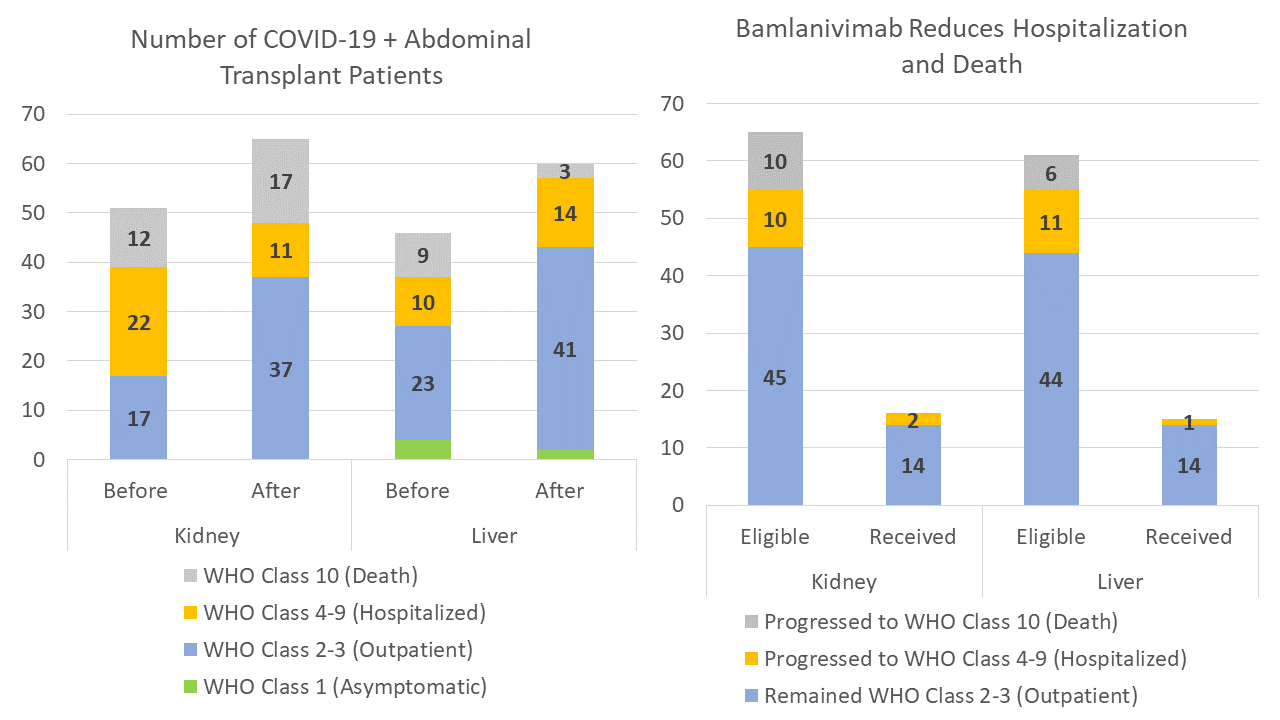Reduction in Hospitalizations and Deaths in Covid-19 Positive Abdominal Organ Transplant Recipients Following Implementation of A Protocol for Early Treatment with Bamlanivimab
Abdominal Transplantation, Keck Medical Center of USC, Los Angeles, CA
Meeting: 2021 American Transplant Congress
Abstract number: LB 4
Topic: Clinical Science » Infectious Disease » COVID-19
Session Information
Session Name: Late-Breaking: COVID-19
Session Type: Rapid Fire Oral Abstract
Date: Monday, June 7, 2021
Session Time: 4:30pm-5:30pm
 Presentation Time: 4:45pm-4:50pm
Presentation Time: 4:45pm-4:50pm
Location: Virtual
*Purpose: In December of 2020, our program was identifying up to twenty COVID-19 positive abdominal transplant recipients per week. After seeing our high hospitalization and mortality rate, we implemented a programmatic response, that included Bamlanivimab administration to all eligible patients. The purpose of this abstract is to review the outcomes of COVID-19 infection in our patients, evaluate the efficacy of our program’s response, and determine if outpatient monoclonal antibody therapy impacted hospitalization and death rates.
*Methods: A database was created to track the outcomes of all liver and kidney transplant recipients who had a confirmed COVID-19 infection via PCR testing. On December 21, 2020, we implemented the following protocol for all symptomatic patients who did not meet hospital admission criteria (WHO Class 2 or 3): 1) Staff and patient education for communications regarding patient’s symptom progression; 2) home monitoring using Pulse Oximetry; and 3) outpatient Bamlanivimab administration to all patients who were identified within 10 days of a positive test.
*Results: As of February 2021, we have identified 105 liver transplant recipients and 116 kidney transplant recipients who have tested positive for COVID-19. These patients were between 27 days and 18.8 years after transplant (Median 1007 days). The case counts and disease severity before and after the protocol was implemented are shown in Figure 1. Concerningly, hospitalized recipients had a 31% and 46% mortality for liver and kidney respectively. To study outpatient Balanivimab therapy, we excluded all patients who presented as inpatient admissions. 86 liver and 91 kidney patients were initially identified as WHO Class 2 or 3. Of these patients, 15 Liver and 16 Kidney patients were treated with Bamlivamab. When comparing those patients who could have potentially been treated to those who received Bamlivamab, we reduced our rates of hospitalization from 29% to 10% and death from 13% to zero. Chi-squared analysis comparing the association between disease progression and antibody administration was significant (p=.04).
*Conclusions: Our findings show the severity of morbidity and mortality of COVID-19 in abdominal transplant patients. Our early experience suggests that outpatient bamlanivimab therapy can reduce disease progression and prevent hospitalization. All eligible patients should be offered this therapy and we will continue to accumulate data in this regard.
To cite this abstract in AMA style:
Ahearn A, Maw T, Emamaullee J, Kim J, Blodget E, Kahn J, Goldbeck C, Sher L, Genyk Y. Reduction in Hospitalizations and Deaths in Covid-19 Positive Abdominal Organ Transplant Recipients Following Implementation of A Protocol for Early Treatment with Bamlanivimab [abstract]. Am J Transplant. 2021; 21 (suppl 3). https://atcmeetingabstracts.com/abstract/reduction-in-hospitalizations-and-deaths-in-covid-19-positive-abdominal-organ-transplant-recipients-following-implementation-of-a-protocol-for-early-treatment-with-bamlanivimab/. Accessed March 4, 2026.« Back to 2021 American Transplant Congress

